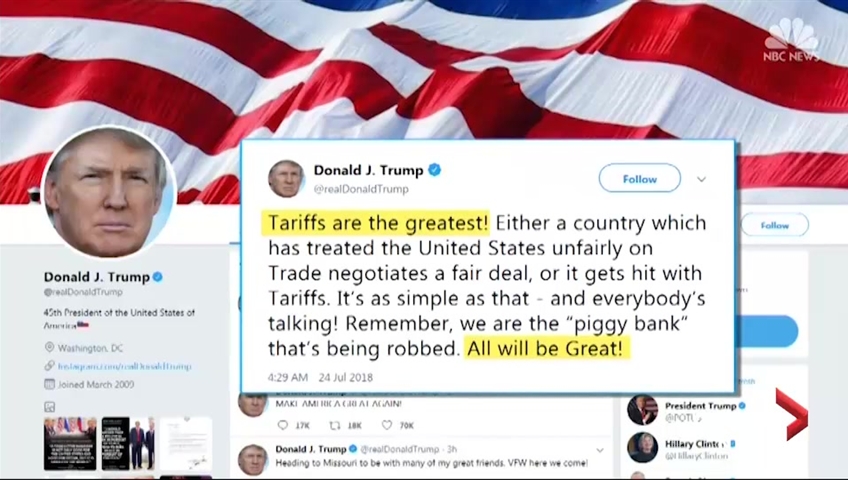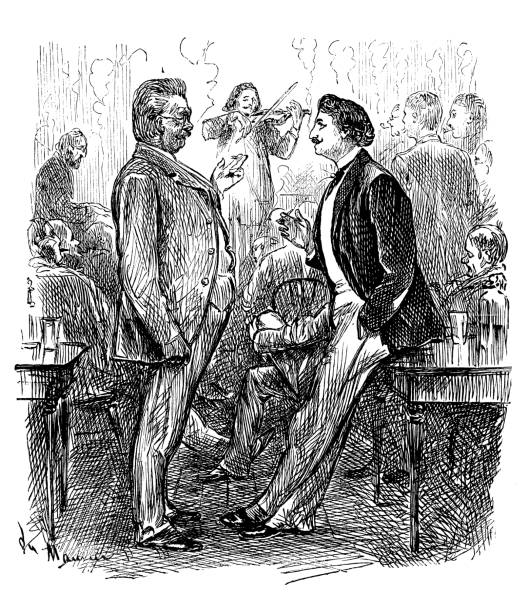Trump's Trade War With Europe: Understanding The Reasons Behind His Outburst

Table of Contents
The "America First" Doctrine and Protectionism
The core tenet of the Trump administration's economic policy was the "America First" doctrine. This nationalist approach prioritized domestic industries and jobs above global economic integration, marking a significant departure from previous US trade policies. This ideology fundamentally reshaped the nation's approach to international trade, leading to increased protectionist measures.
- Prioritization of domestic industries over global competition: The administration actively sought to protect US industries, regardless of the impact on global trade relationships. This often involved imposing tariffs and other restrictions on imports.
- Belief in the need to renegotiate unfavorable trade deals: Trump consistently criticized existing trade agreements, arguing they were unfair to the United States. This led to attempts to renegotiate or withdraw from agreements like the Trans-Pacific Partnership (TPP).
- Emphasis on reducing the US trade deficit: A key goal was to reduce the US trade deficit, often perceived as a sign of economic weakness. This objective fueled the imposition of tariffs aimed at decreasing imports and increasing exports.
- Use of tariffs as a primary tool to achieve these goals: Tariffs became the administration's primary weapon in its trade disputes, impacting various sectors and countries, including the European Union. The imposition of tariffs on steel and aluminum, for example, directly targeted European producers.
This protectionist ideology directly influenced Trump's aggressive approach to trade negotiations with the European Union, leading to escalating tensions and retaliatory measures. The belief in the inherent unfairness of global trade agreements fueled the conflict.
Specific Grievances with European Trade Practices
Beyond the overarching "America First" philosophy, the Trump administration had specific grievances with certain European trade practices. These concerns, often voiced publicly, fueled the trade war's intensity.
- High tariffs on US agricultural products: The US complained about high tariffs imposed by the EU on various agricultural products, hindering American exports and impacting farmers. This was a significant point of contention.
- Concerns about European subsidies to certain industries: The administration accused the EU of providing unfair subsidies to certain industries, giving European companies an unfair competitive advantage in the global market. These subsidies were seen as distorting global trade.
- Disputes over intellectual property rights: The US expressed concerns about the protection of intellectual property rights within the EU, alleging insufficient enforcement and losses for US companies.
- The Airbus-Boeing subsidy dispute: A long-standing dispute over alleged illegal subsidies provided to Airbus by European governments and Boeing by the US government further exacerbated tensions. This World Trade Organization (WTO) case added fuel to the fire, with both sides imposing retaliatory tariffs.
These specific grievances, supported by data and detailed case studies, underpinned the Trump administration's aggressive trade actions against the EU. The Airbus-Boeing dispute, in particular, highlighted the complexities and long-standing tensions in transatlantic trade relations.
The Role of National Security Concerns
The Trump administration frequently invoked national security concerns to justify trade restrictions against Europe. This argument allowed for the imposition of tariffs outside the usual WTO framework.
- Concerns about reliance on European manufacturers for critical goods: The administration expressed concerns about US reliance on European manufacturers for certain critical goods and technologies, arguing this dependence posed a national security risk.
- Allegations of unfair competition and economic espionage: Accusations of unfair competition and even economic espionage against European companies further fueled the narrative of a national security threat.
- Use of Section 232 of the Trade Expansion Act of 1962: This act allowed the administration to impose tariffs on imports deemed a threat to national security, providing a legal basis for the actions, although the legal justification remains contested.
While the national security argument provided a powerful justification for trade restrictions, its validity and impact remain subjects of ongoing debate. The extent to which these concerns reflected genuine national security risks or served as a justification for protectionist measures is still debated by economists and political scientists.
Political and Domestic Factors Influencing Trump's Decisions
Domestic political considerations played a significant role in shaping Trump's trade policy, influencing both the intensity and duration of the trade war with Europe.
- Appealing to a protectionist electorate: Trump’s campaign rhetoric heavily featured protectionist themes, resonating with a segment of the electorate concerned about job losses and global competition. This appeal translated into policy.
- Using trade disputes as a bargaining chip in other negotiations: Trade disputes, including those with Europe, were sometimes used as leverage in other diplomatic negotiations, adding a layer of complexity to the situation.
- The impact of lobbying groups and special interests: The influence of various lobbying groups and special interests, representing different sectors of the US economy, impacted the administration's decision-making process.
These domestic factors, intertwined with broader economic and geopolitical considerations, reveal the multifaceted nature of Trump's trade war with Europe, highlighting the interplay of political strategy, economic policy, and national interests.
Conclusion
Trump's trade war with Europe resulted from a complex interplay of factors. The "America First" ideology, specific grievances with European trade practices, invoked national security concerns, and significant domestic political considerations all contributed to the escalating tensions. Understanding this complex interplay is crucial for interpreting the events and their consequences.
Call to Action: Understanding the multifaceted reasons behind Trump's trade war with Europe is essential for navigating the complexities of future international trade relations. Further research into the long-term economic and political consequences of these actions is crucial to avoiding similar escalations in the future. Continue learning about the intricacies of Trump's trade war with Europe to gain a deeper understanding of global economic policy and the potential impact of protectionist measures on international relations.

Featured Posts
-
 How To Prepare For Flash Floods Understanding Flood Alerts And Warnings
May 26, 2025
How To Prepare For Flash Floods Understanding Flood Alerts And Warnings
May 26, 2025 -
 Fin De La Semaine Des 5 Heures Sur La Premiere Explications De La Rtbf
May 26, 2025
Fin De La Semaine Des 5 Heures Sur La Premiere Explications De La Rtbf
May 26, 2025 -
 Glasgows Gritty Transformation How Martin Compstons Thriller Reimagines The City
May 26, 2025
Glasgows Gritty Transformation How Martin Compstons Thriller Reimagines The City
May 26, 2025 -
 2025 Paris Roubaix Examining The Gravel Tech And Tire Innovations
May 26, 2025
2025 Paris Roubaix Examining The Gravel Tech And Tire Innovations
May 26, 2025 -
 E3 Saxo Classic Spectator Avoids Jail After Spitting At Mathieu Van Der Poel
May 26, 2025
E3 Saxo Classic Spectator Avoids Jail After Spitting At Mathieu Van Der Poel
May 26, 2025
Latest Posts
-
 Gorillazs 25th Anniversary House Of Kong Exhibition And London Shows Announced
May 30, 2025
Gorillazs 25th Anniversary House Of Kong Exhibition And London Shows Announced
May 30, 2025 -
 Gorillaz 25th Anniversary London Shows And House Of Kong Exhibition Announced
May 30, 2025
Gorillaz 25th Anniversary London Shows And House Of Kong Exhibition Announced
May 30, 2025 -
 House Of Kong Gorillazs 25th Anniversary Exhibition And London Concerts
May 30, 2025
House Of Kong Gorillazs 25th Anniversary Exhibition And London Concerts
May 30, 2025 -
 Gorillaz Celebrate 25 Years With House Of Kong Exhibition And Special London Performances
May 30, 2025
Gorillaz Celebrate 25 Years With House Of Kong Exhibition And Special London Performances
May 30, 2025 -
 Gorillaz Celebrate 25 Years With House Of Kong Exhibition And Special London Gigs
May 30, 2025
Gorillaz Celebrate 25 Years With House Of Kong Exhibition And Special London Gigs
May 30, 2025
